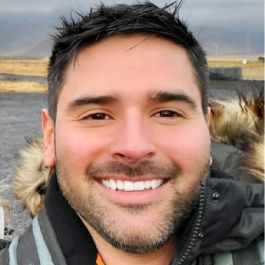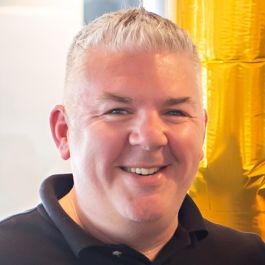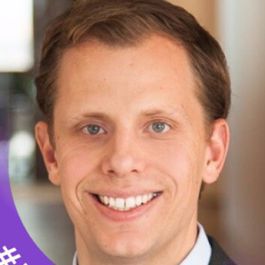In February 2021, snow, ice and freezing temperatures pummeled Texas’ electric grid. At the peak of the outages, more than 4.5 million homes and businesses stood without power, forcing millions of residents to shiver in the dark.
For Pierce Birkhold, co-founder of Austin-based RealWork Labs, the unprecedented loss of power, heat and water services elicited an implicit sense of obligation. As the occupant of a house near a fire station, Birkhold had the rare fortune of living in an area that maintained power in the wake of this unprecedented, devastating winter storm. With his small team of employees scattered across the city, Birkhold extended an invitation to anyone in the company who wanted to seek refuge at his house.
“There are figurative storms to live through, and then there are literal ones,” said Birkhold, who founded RealWork Labs with Rusty Fincke in August 2020. “It was a time when we needed to band together. Not just being able to work, but simply needing to shower and have warmth.”
At the time, Covid-19 vaccines were not yet available to the general population. But the compounding crises nonetheless presented a welcome change for a company born during the pandemic.
For the first time in the company’s history, the RealWork Labs team was working together, face-to-face. Flat surfaces were commandeered. Couches were claimed. A particular type of energy pulsated throughout the home that had never been generated in a virtual space.
“It was at that moment when we kind of looked at each other and said, ‘This feels like a legit company,’” Fincke said. “Bullshitting together, having the proverbial watercooler talk — I remember looking at everyone and being like, ‘This is awesome.’”
The anomalous blizzard has since faded, but the spirit of camaraderie remains. A startup that creates marketing software to ensure trust between home service businesses and their customers, RealWork Labs recently closed a $2.5 million funding round and has grown from its humble origins to a team of 50 with a roster of 500 home service customers throughout the United States.
Built In Austin met with Birkhold, Fincke and Vice President of Business Operations Scott Hartig to discuss how the company’s people-first mentality extends to its customers, and how its plan to democratize content marketing with video testimonials and word-of-mouth recommendations plants longer-lasting roots in the communities they serve.
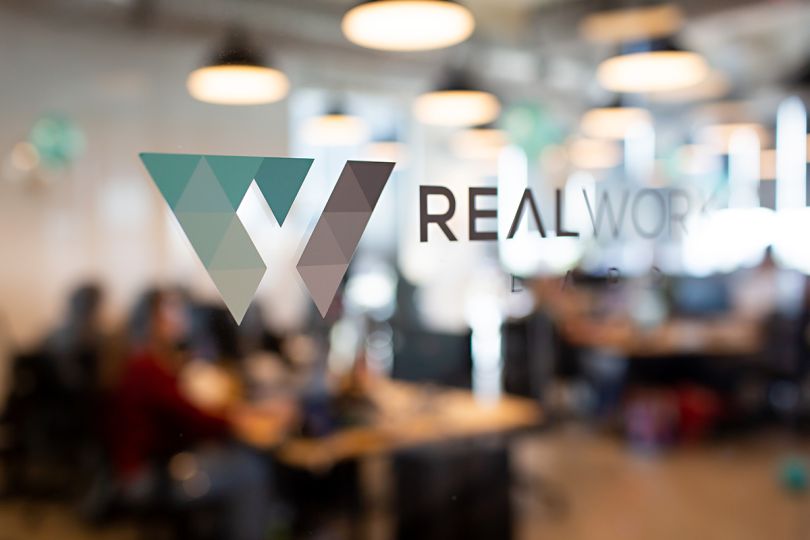
What challenges did starting a company during a pandemic present?
Birkhold: Starting when we did offered us the flexibility to adapt immediately to the changes the pandemic presented. Right away, we didn’t have to do the major pivoting or overhauling that existing businesses had to. Yes, being remote was certainly different having come from an office culture. But if anything, it enabled us to fit in this environment, because that was our starting point.
Your company is also uniquely suited to the pandemic, with so many people spending more time at home and reconsidering their living situations.
Birkhold: Absolutely, and that messaging has really resonated with what we’re offering: people wanting on-demand services at home, versus driving out for it. And the home services market has always operated that way. You don’t drive to the store to fix your plumbing — they come to your house.
What does your company’s growth say about your organization internally and the service you’re providing?
Fincke: We began the company as a lifestyle business, thinking maybe we can get a couple hundred customers, put some extra cash in our pockets and still keep our full-time jobs. We quickly realized that there was a good market fit for this and played with the price points in the marketplace, and we soon saw the product get traction. That’s when we started to see that growth and decided to pursue it full time.
It’s really exciting. And it’s crazy that at the same time we’re responsible for 50 people. There’s tremendous pressure, but it’s also fun. We still have lots of problems to solve, but we’re starting to tackle those and really hyper-focused on getting good traction for our clients. Because, yes, there’s a part of us doing this for ourselves, but our revenue comes from getting results for our clients. Knowing that we’re pulling this lever or pushing this button and able to make positive changes — that’s where momentum is really starting to pick up for us.
“Rather than being a solution looking for a problem, we were built firsthand from problems.”
Birkhold: We started from a question of creating value. What do businesses need? How can we bring in some revenue? So rather than being a solution looking for a problem, we were built firsthand from problems. Once we found that product-market fit, it made perfect sense to further invest in building our own product around that. There was a high level of flexibility in what we were going to grow up to be, because we didn’t sink all of our eggs into building a solution without fully knowing the market.
What was it like going from two people taking a chance to building a larger team?
Fincke: One of our core values is “people first,” and from the minute we decided to go with payroll, we had others say, “Listen, I want to come on board, but I need health insurance.” So we looked at our finances to see what we could come up with. Fortunately, we lucked out with some amazing insurance when we started, and we’ve just continued to build on this idea that we might be the quintessential scrappy startup, but we need to invest in our people and pay decent wages and offer good benefits.
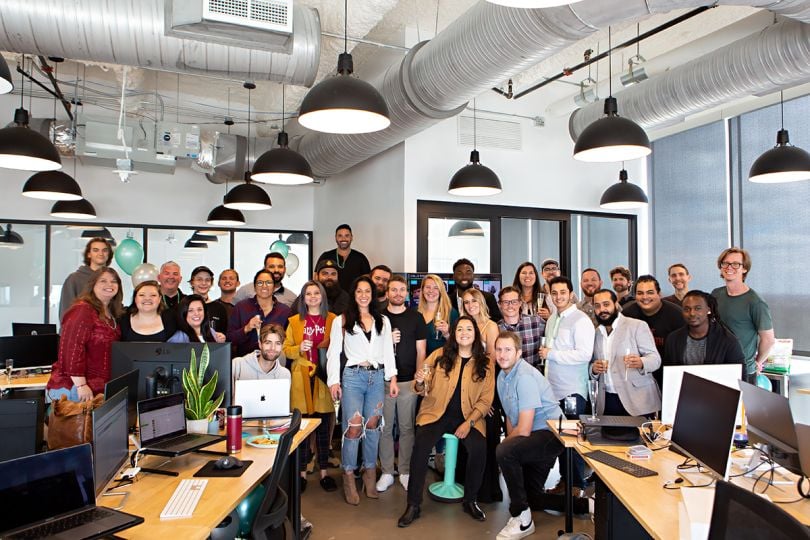
RealWork Labs offers a hybrid work model, but 90 percent of your employees choose to work in the physical office. Why do you think that is?
Fincke: It’s that watercooler talk. Even as we’re doing interviews now, people are telling us that they love the fact that we have an office and that they’re tired of working from home. People are genuinely enjoying rubbing shoulders with somebody who’s doing the same job that they are. And then there’s the ability for us to communicate across teams.
Slack created this timelapse of, “Well, did they see it?” When communication is clear, it helps move business forward. You can hear tonality and all of the things you gain by being in-person, and our office has brought that aspect of work back. And then you just get that environment of bullshitting in the elevator or in the hallway, asking what you’re doing this weekend and all of those things. We’re getting to know each other and building relationships that you just can’t do over the computer.
Hartig: Being in-person in the office gives people who are just starting out in their careers the opportunity to not just read a script or a training manual or attend webinars to learn about how they should do their job. You really get that hands-on coaching from your mentors by being in the office, both from your coworkers and managers, as well as all of the valuable feedback that you get just through the osmosis of being around the day-to-day work of people conducting their jobs.
How does your people-first approach affect the way you go about hiring?
Birkhold: Tech is a huge driver of the economy, and a lot of people want access to technology. But it’s not a place that’s very open to entry-level workers. So a lot of our recruiting has come through word of mouth and referrals.
There’s always a benefit to having diverse backgrounds. In order to enable that kind of hiring, you have to have very sharp educators, frontline managers and very competent management teams. Because if you bring on someone who’s never used Salesforce or who’s never picked up a mouse to do their job, and if you don’t have good support to teach them how to do it, then you’re only compounding the problem.
“There was a high level of flexibility in what we were going to grow up to be, because we didn’t sink all of our eggs into building a solution without fully knowing the market.”
What excites you as you continue growing the company?
Birkhold: We’re reimagining trust online. In terms of how this looks for home services today, that revolves primarily around online reviews. But they’re one-dimensional. When I look on Google, I see you have 250 reviews. But it’s just an aggregate score. That may be OK for a restaurant if I’m going to go and spend $100, but it’s way different when it’s $12,000. With that in mind, we’re building a platform that enables homeowners and technicians to be heard — a platform for them to take photos and videos on location, which tells the story of the work being done.
The platform that we’re building is all about finding ways for these businesses to validate, show and enable trust with people in an area they’ve worked in. And then from the consumer side, allowing them to know more about these companies so that they can make an educated decision and actually be able to trust that person. We’re building two-way communications that not only capture that data, but then also present it in an advantageous way on digital properties so that the home service business can let their work and previous customers speak on their behalf.
That sense of trust works in two ways when starting a company: You’re building trust with your own employees, and by extension your customers and clients as well.
Birkhold: Exactly. Because how do you trust anyone online? What are the proof points that make people trust? What causes distrust? These are the kinds of questions that we’re answering.
Your home is your biggest asset. No one’s going to drop $20,000 without really knowing someone is reliable. Anything mediated online can be gamed and can be in question, and we want to remove those hesitancies. We want to remove friction from not only the best presentation, but the real work that’s done — hence, RealWork.


